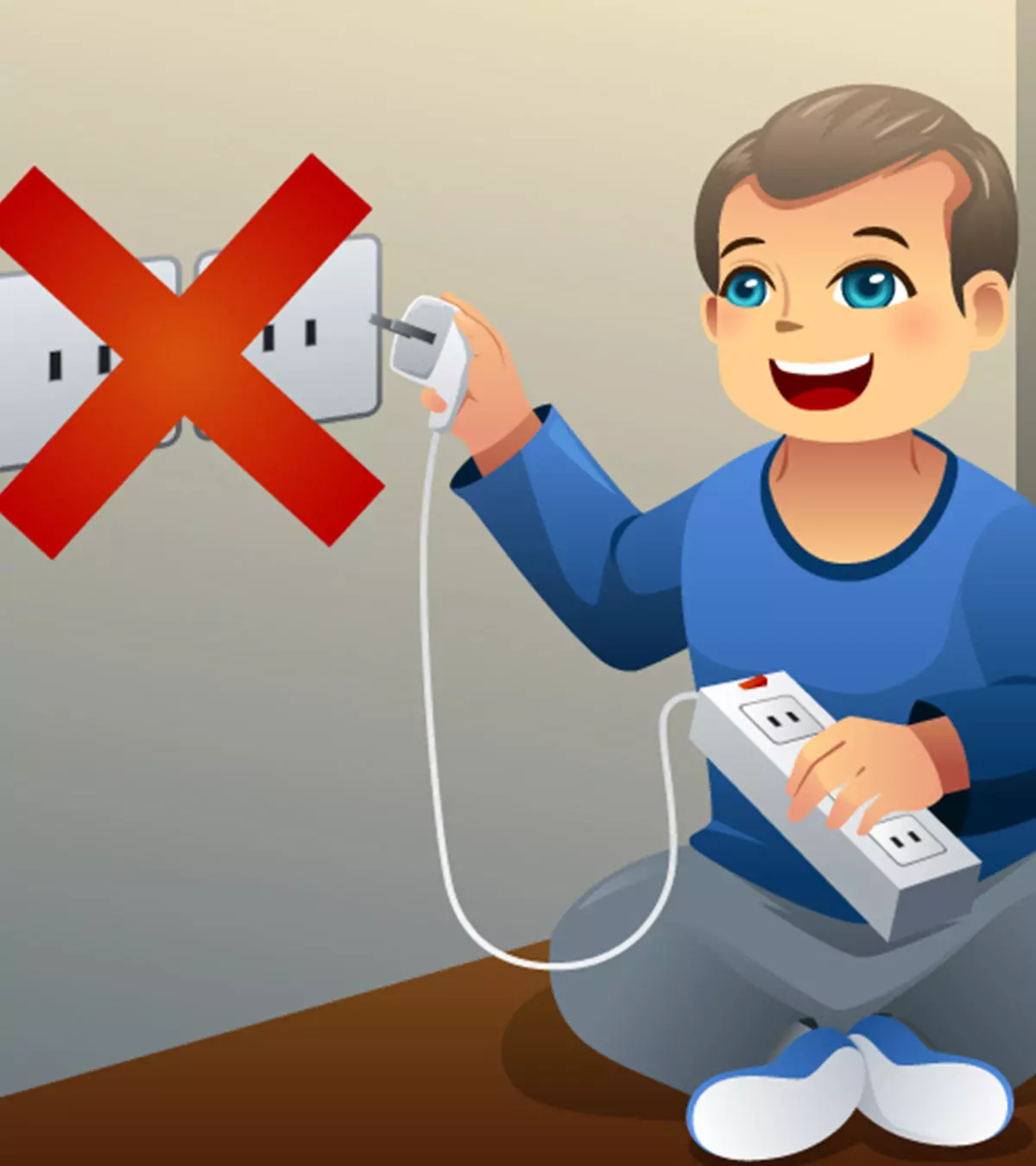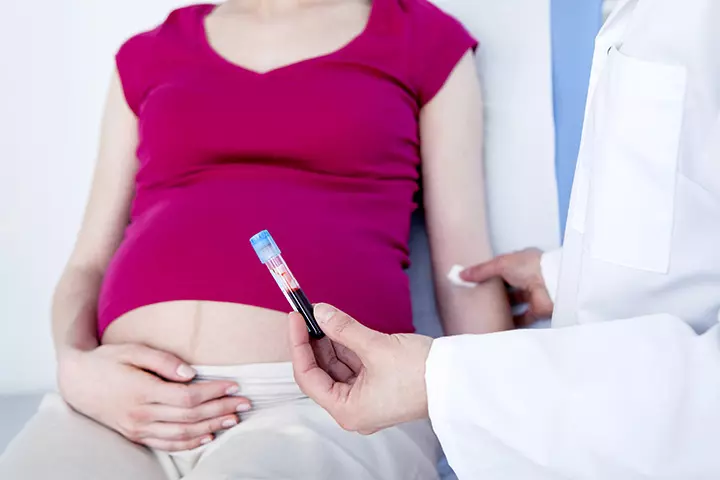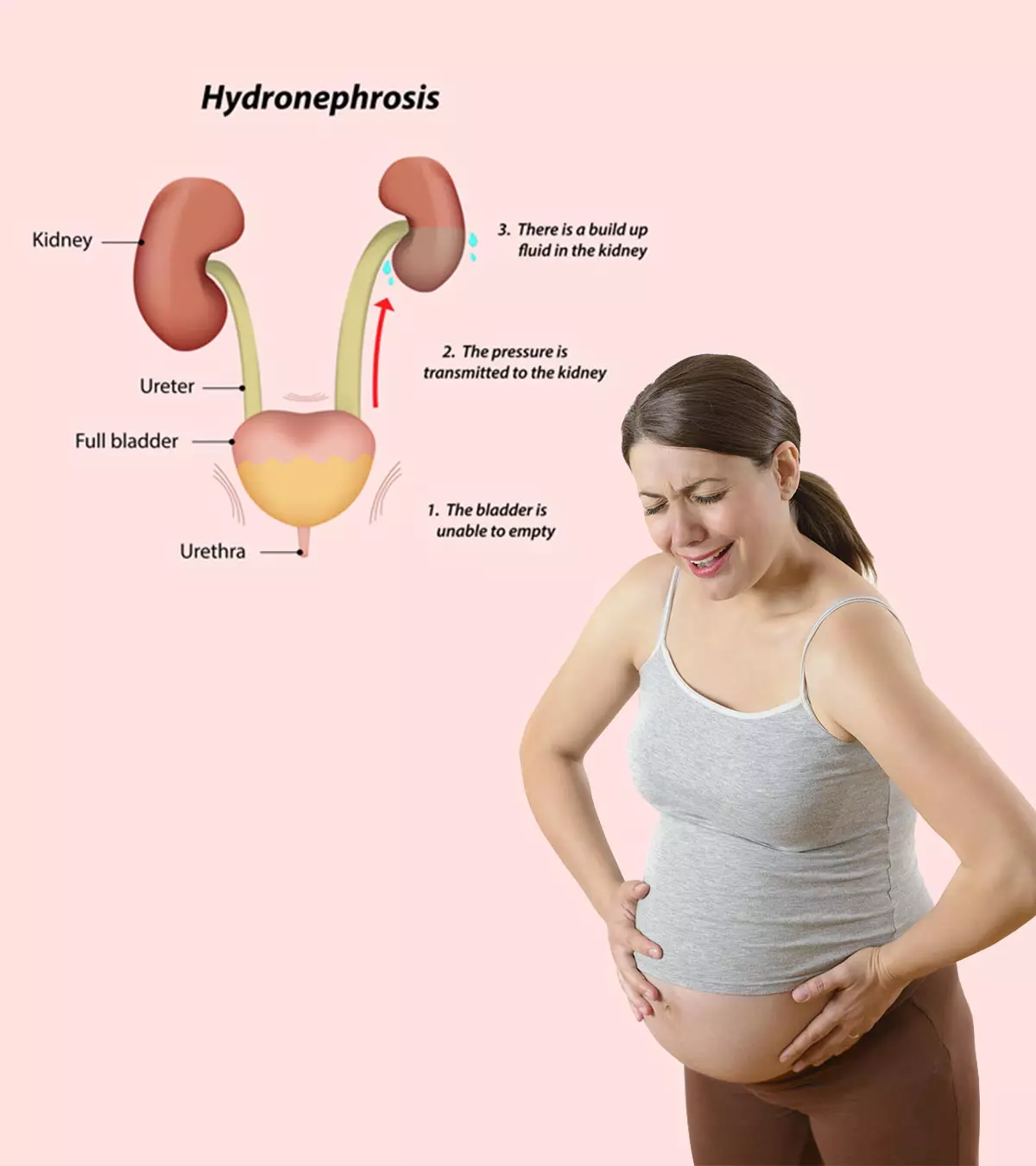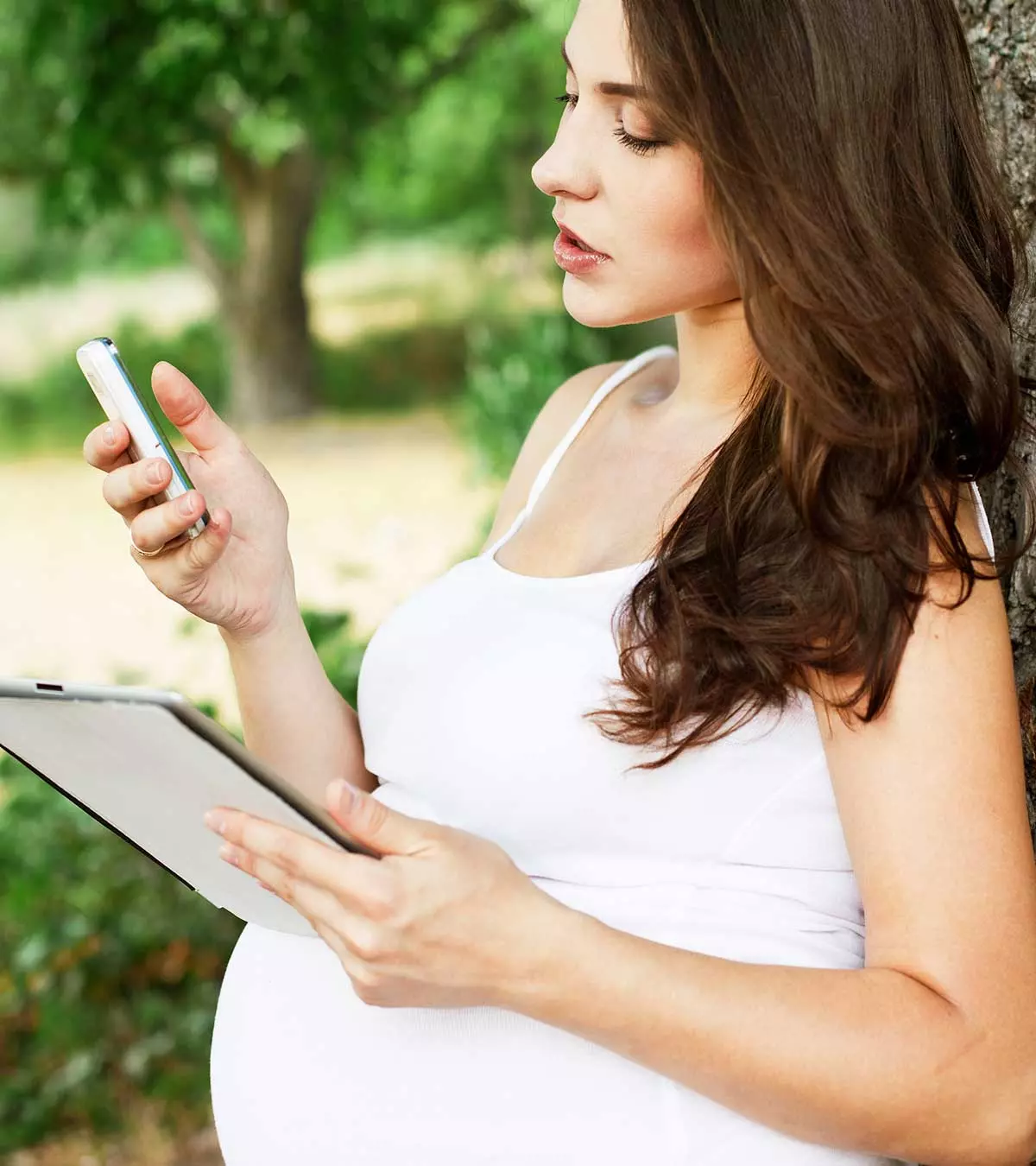
Image: ShutterStock
Most people are oblivious to the harmful effects of using mobile during pregnancy and how they impact the fetus. Studies have shown that excessive use of mobile phones during pregnancy has been linked to the shorter duration of pregnancy and increased risks of preterm labor. Furthermore, recent results of studies performed by the Yale school of medicine have revealed that women who have extensive exposure to mobile phone radiations during pregnancy give birth to babies who suffer from behavioral problems later on in their lives. These harmful radiations also impact the fetus’ brain development and induce hyperactivity. Thus, you need to research more on the effect of these radiations on fetal development and consult your gynecologist during antenatal care, and determine the safe duration for mobile phone use. Keep reading this post as we discuss the effects of mobile phones on expecting mothers and the safe duration while using them.
Key Pointers
- Excessive use of mobile devices during pregnancy can lead to shorter gestational periods and increase the risk of premature birth.
- As per a study, pregnant women exposed to high levels of mobile phone radiation gave birth to children with behavioral issues.
- Radiation from mobile devices may harm fetal brain development and cause hyperactivity.
- The WHO classifies radiofrequency electromagnetic radiation generated by wireless devices, including mobile phones, as potentially carcinogenic.
Should You Worry Over Wireless?

Image: IStock
In today’s world, you don’t just rely on mobile phones to stay in touch with your near and dear ones and get any sort of work done. The laptops, tablets, and all other wireless internet connections are pervasive, no matter when and where. All these electronic devices emit and receive electromagnetic radio waves to communicate with one another and the outside world. At least a tiny fraction of these waves end up inside the body. When your body is exposed to a higher extent to these waves, they can cause DNA damage and change the conformation of molecules of the living cells. The after-effects whether they remain for the long term or not depends on the frequency and strength of the waves.
Wireless devices are the only sources where you will expose yourself to radio waves. Did you know that the sun, X-ray machines, radio, microwave, granite countertops, and airplanes all emit radio waves of varying levels? Therefore, it is advisable to limit exposure to them. Your doctor may also recommend avoiding unnecessary waves or loud noises during pregnancy.
What Do Researchers Say About Mobile Phones During Pregnancy?
Since the energy of the waves from the mobile phone lies somewhere in between the X-rays and the granite countertop, researchers raise doubts on whether the waves can affect the fetuses. In a growing baby, the cells are fast replicating and vulnerable to outside disturbances.
 Research finds
Research findsBut studies have so far been unable to find anything that causes concerns regarding mobile phone usage.

Image: IStock
Study One:
A team of scientists led by Dr. Hugh S. Taylor at Yale exposed pregnant mice to mobile phones by keeping the phones active. They placed muted phones on active phone calls above the cage for two weeks. There was another control group also with the same conditions, but with a deactivated phone.
The baby mice were then tested for their behavior and memory capacity. Mice born to mothers exposed to the mobile phone activity found to have behavioral problems that are characteristic of ADHD in humans. However, research in mice may not always hold true in human beings. And in this case, there is a high possibility since humans may not spend all 24 hours in 7 days over the mobile phone during pregnancy (1).
Study Two:
Here is another study by scientists in Denmark. They examined the prenatal and postnatal exposure to mobile phones and behavioral problems in children. Mother’s of seven-year olds were given a questionnaire regarding the health and behavior of their children, and the history of past exposure to the phone. After the survey, they found that exposure to mobile phones prenatally and postnatally, to a lesser extent, was associated with hyperactivity and other behavioral problems in children (2).
The researchers interpreted that these associations may be due to unmeasured confounding and non-causal. Also, in response, the UK National Health Service wrote, “This study cannot prove a proper association between pregnant’s exposure to mobile and behavioral problems.”
It is, therefore, important to note that research studies of this kind cannot prove an exact link between mobile usage during pregnancy and developmental disorders in children.
What Are The Impacts Of Overuse Of Mobile Phones During Pregnancy?

Image: IStock
The usage of cell phones has increased in the past decade since they are used for more than phone calls. The phones now-a-days are mini computers, music systems, and gaming systems. Thus, the general usage and radiation of portable gadgets have increased.
 Point to consider
Point to consider- Although researchers have not yet fully understood the effects of low level radiation on the DNA and cells.
- However, a correlation exists between radiation and physiological and/or neurological disorders in a child.
- This may not be the definition of a cause and effect relationship; it might be something you want to take care of.
- The WHO (World Health Organization) defines such radiofrequency electromagnetic radiation emitted by wireless devices (such as mobile phones) as possibly carcinogenic (3). Furthermore, studies have demonstrated an increased miscarriage risk associated with magnetic field exposure (4).
By balancing phone usage with traditional self-care methods, pregnant women can improve both their well-being and the health of their baby.
What Is The Outcome?
The use of mobile phones during pregnancy may provide benefits such as easy access to prenatal education information, which includes topics such as breastfeeding, safe exercises, medication safety, childbirth preparation, and postpartum recovery. But caution has to be exercised, as research regarding the safety of mobile phone use during pregnancy is inconclusive. The WHO (World Health Organization) also states that “Pregnant women have not raised any health concerns about using the mobile phone (5).”
You need to take extra precautions to ease the worries. Here are a few tips that will keep you and your baby safe:
- Keep your mobile phone a few feet away if you are not using it
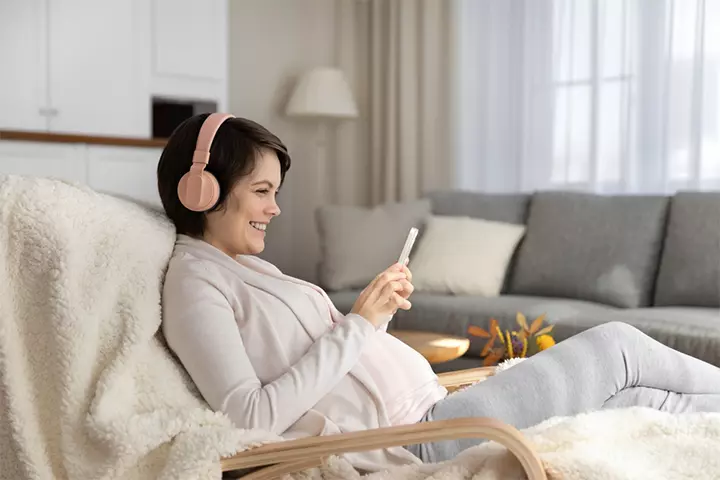
Image: Shutterstock
- You can consider using it hands-free, such as on speakerphone mode or with a headset.
- Instead of talking, opt for texting, and while sending the text, keep the phone as far away as possible before pressing the send button.
- In case the call is urgent, keep it as short as possible.
- Whenever possible, use a corded phone.
- Make calls in areas with high coverage networks and avoid ones with low reception, where phones emit more radiation because they try harder to connect.
- Reducing your screen time is advisable during all stages of life, particularly during pregnancy, where everything that you experience has a direct impact on fetal health.
- Do not carry mobile in your pocket since it can be close to your belly
- Do not keep the mobile under your pillow when sleeping
- Avoid using phones to kill time if reflux or backache keeps you awake at night, instead consider reading or meditating
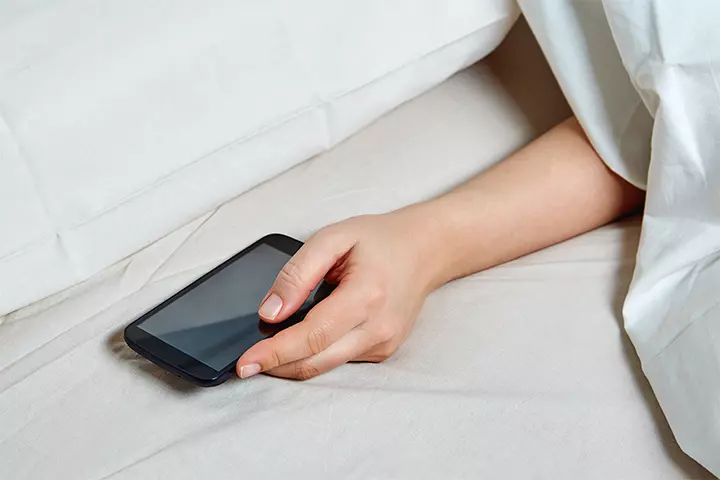
Image: IStock
Frequently Asked Questions
1. Is there a recommended distance between pregnant women and their mobile phones?
Using a mobile phone 30 cm to 40 cm away from the body (text messaging, accessing the Internet, or using a “hands-free” device) is considered to have a much lower exposure to radiofrequency fields than holding the handset against the head. Therefore, this may be a safe distance for pregnant women to follow in order to reduce their exposure to radiofrequency fields and promote maternal well-being (5).
2. How much mobile phone radiation is safe for pregnant women to be exposed to?
A study revealed adverse pregnancy outcomes in women exposed to more than 2.5mG radiation (6). An exposure below this may be considered safe.
3. Is it safe for pregnant women to use a wireless charger?
There is no current scientific evidence to assess the safety of wireless chargers for pregnant women. However, the electromagnetic field exposure due to wireless chargers is considered low.
4. Is it safe for pregnant women to use Bluetooth headsets?
Hands-free devices are considered to have lower exposure than holding a phone close to the body (5). Bluetooth headsets being hands-free devices, may fall in the same category. However, there is no scientific evidence regarding their safety, particularly in relation to maternal health.
Smartphones have become an integral and indispensable part of life. Nowadays, people can’t live without their smartphones and spend hours on them. However, the overuse of smartphones can cause various complications. Using mobile phones during pregnancy can also increase the risk of physiological and neurological disorders in the baby. Hence, it is recommended to reduce your phone usage to avoid maternal stress and promote your and your unborn baby’s mental health. Instead, you can keep yourself busy reading something or indulging in activities such as gardening, yoga, or writing.
Infographic: Impact Of Cell Phone Use During Pregnancy
When it comes to pregnancy, there is a concern that the use of cell phones may negatively impact both the expectant mother and the developing baby. This infographic explores the potential impacts of cell phone use during pregnancy and the right ways to use it to minimize any potential risks.
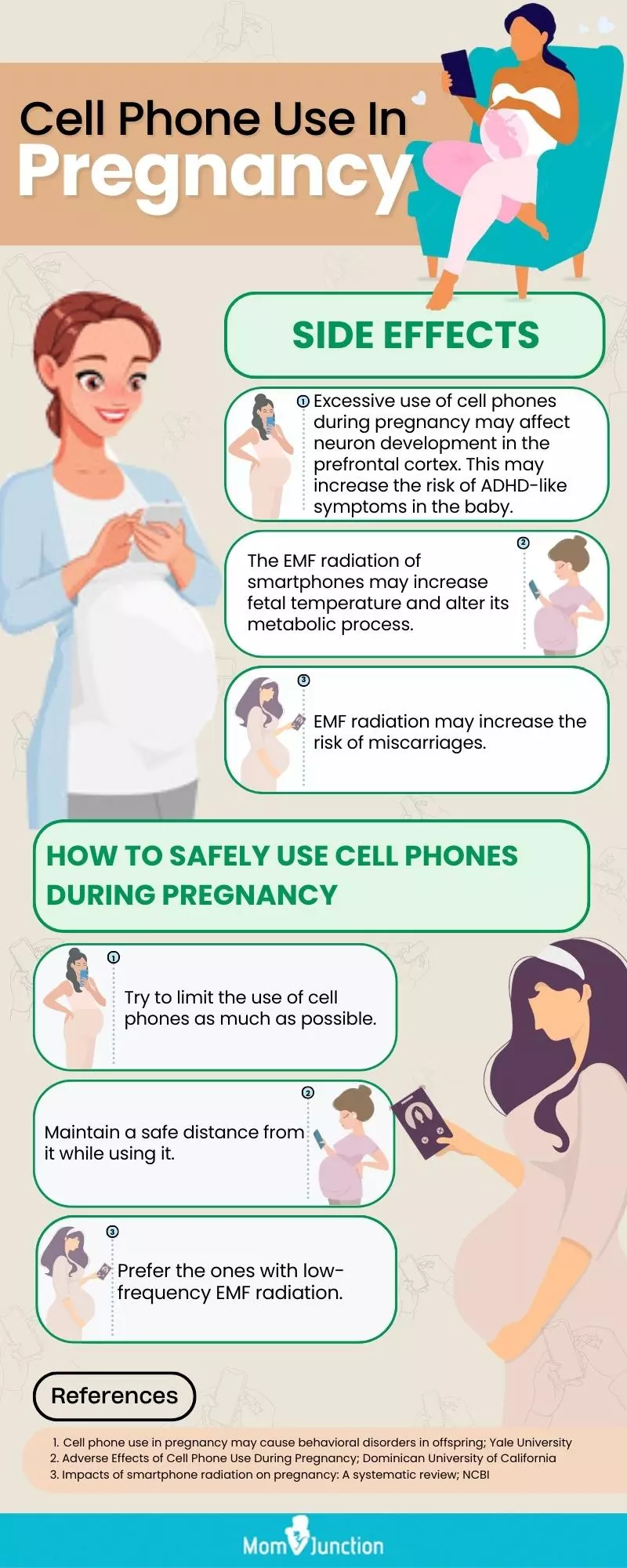
Illustration: Momjunction Design Team
Illustration: Using Mobile Phone During Pregnancy - Is It Safe?
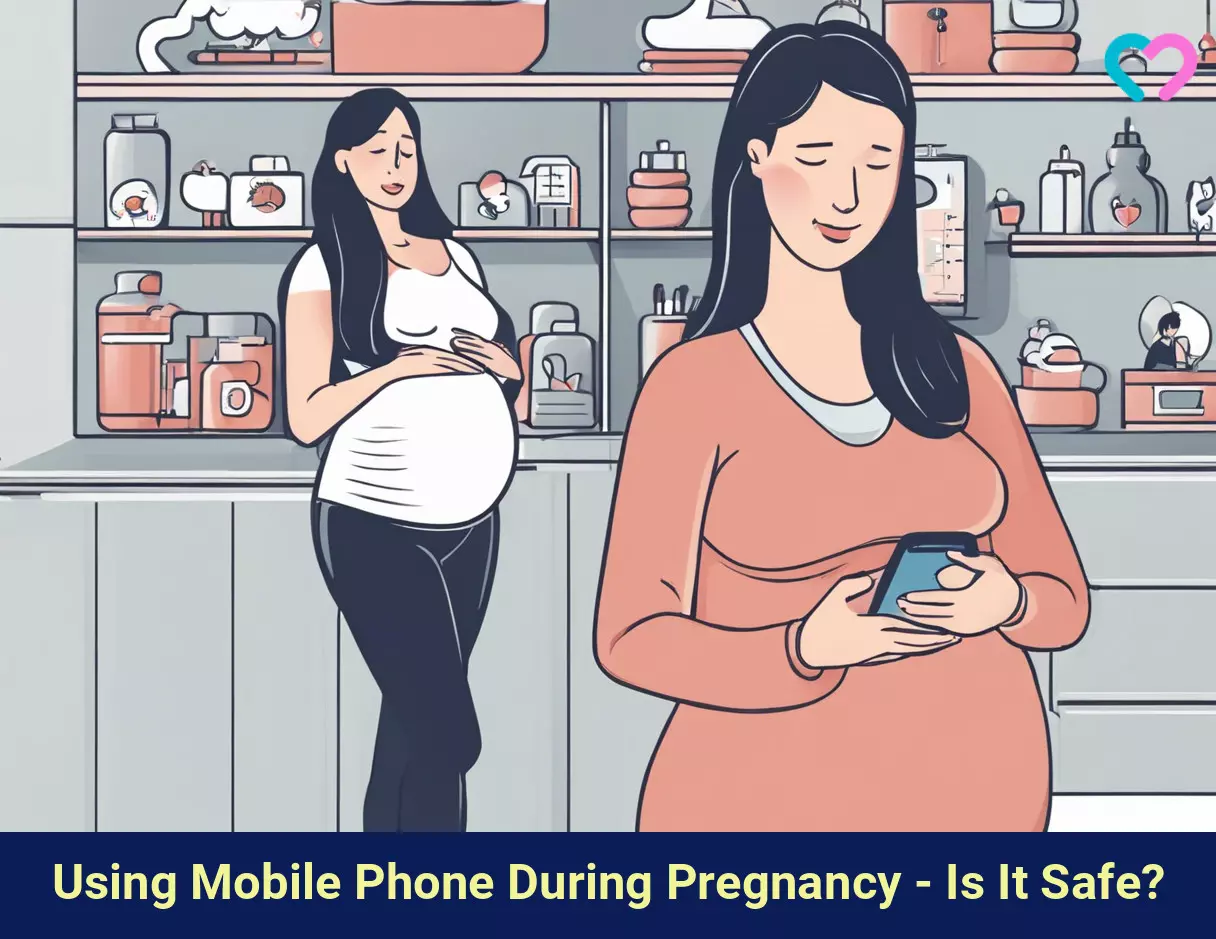
Image: Stable Diffusion/MomJunction Design Team
Cell phone usage during pregnancy is believed to be harmful. Don’t believe it? Check out this video where the risks and how they can affect your child’s health are shared.
References
- Tamir S. Aldad et al.; (2012); Fetal Radiofrequency Radiation Exposure From 800-1900 Mhz-Rated Cellular Telephones Affects Neurodevelopment and Behavior in Mice.
https://www.ncbi.nlm.nih.gov/pmc/articles/PMC3306017/ - Hozefa A Divan et al.; (2008); Prenatal and postnatal exposure to cell phone use and behavioral problems in children.
https://pubmed.ncbi.nlm.nih.gov/18467962/ - IARC Classifies Radiofrequency Electromagnetic Fields As Possibly Carcinogenic To Humans.
https://www.iarc.who.int/wp-content/uploads/2018/07/pr208_E.pdf - De-Kun Li et al. (2017); Exposure to Magnetic Field Non-Ionizing Radiation and the Risk of Miscarriage: A Prospective Cohort Study.
https://idp.nature.com/authorize?response_type=cookie&client_id=grover&redirect_uri=https%3A%2F%2Fwww.nature.com%2Farticles%2Fs41598-017-16623-8 - Electromagnetic fields and public health: mobile phones.
https://www.jeic-emf.jp/documents/pdf/fact_sheet_193.pdf - Imteyaz El Jarraha and Mohammad Rababab; (2022); Impacts of smartphone radiation on pregnancy: A systematic review.
https://www.ncbi.nlm.nih.gov/pmc/articles/PMC8823972/# - Boileau NT et al., (2020); Mobile phone use during pregnancy: Which association with fetal growth?
https://pubmed.ncbi.nlm.nih.gov/32623065/ - Vidyadhar B. Bangal et al., (2017); Use of mobile phone for improvement in maternal health: a randomized control trial.
https://www.ijrcog.org/index.php/ijrcog/article/view/3806
Community Experiences
Join the conversation and become a part of our nurturing community! Share your stories, experiences, and insights to connect with fellow parents.
Read full bio of Dr. Swati Chitnis
- Dr. Swati Chitnis is a gynecologist and endoscopic surgeon with over 8 years of experience. She did her bachelor in medicine at BJ Medical College & Sassoon Hospital, Pune, India and MS at the prestigious King Edward Memorial Hospital, Mumbai. She worked in various hospitals in Mumbai and currently runs her private practice.
 Dr. Swati Chitnis is a gynecologist and endoscopic surgeon with over 8 years of experience. She did her bachelor in medicine at BJ Medical College & Sassoon Hospital, Pune, India and MS at the prestigious King Edward Memorial Hospital, Mumbai. She worked in various hospitals in Mumbai and currently runs her private practice.
Dr. Swati Chitnis is a gynecologist and endoscopic surgeon with over 8 years of experience. She did her bachelor in medicine at BJ Medical College & Sassoon Hospital, Pune, India and MS at the prestigious King Edward Memorial Hospital, Mumbai. She worked in various hospitals in Mumbai and currently runs her private practice.
Read full bio of Anshuman Mohapatra
Read full bio of Rebecca Malachi
Read full bio of Dr. Joyani Das















